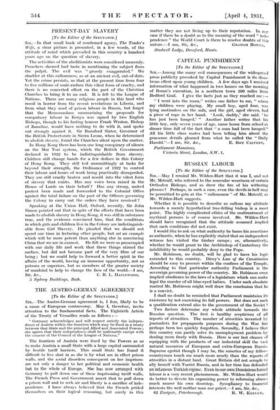RUSSIAN LABOUR
[To the Editor of the SPECTATOR.] SIR,—May I remind Mr. Wilden-Hart that it was I, and not Mr. Metcalf, who referred to the muscular weariness of certain Orthodox Bishops, and so drew the fire of his withering phrases? Perhaps, in such a case, even the devils in hell may be permitted to grin at the " callousness " of Mr. Metcalf, as Mr. Wilden-Hart suggests.
Whether it is possible to describe as callous my attitude towards a merely hypothetical tree-felling bishop is a moot point. The highly complicated ethics of the maltreatment of mythical persons is of course involved. Mr. Wilden-Hart should have recognized that the attitude assumed implied that such conditions did not exist.
I would like to ask on what authority he bases his assertions as authentic, when he has explicitly stated that no independent witness has visited the timber camps ; or, alternatively, whether he would grant to the Archbishop of Canterbury the infallibility he would probably deny to the Pope.
Mr. Robinson, no doubt, will be glad to have his logic extended to this country. Dicey's Law of the Constitution should be easy to procure within the confines of the Temple. According to that particular authority Parliament is the sovereign governing power of the country. Mr. Robinson owes implicit obedience to the laws of a legislature which can make legal the murder of all blue-eyed babies. Under such absolute control Mr. Robinson might well draw the conclusion that he is a convict.
I shall no doubt be reminded that Parliament maintains its existence by not exercising its full powers. But does not such a qualification extend also to the government of the Soviet ?
Two factors determine my whole attitude towards the Russian question. The first is healthy scepticism of all reports of atrocities. The number of atrocities invented by journalists for propaganda purposes during the War has perhaps been too quickly forgotten. Secondly, I believe that this country can partly solve its unemployment problem by dealing more freely with Russia. Here is our last chance of equipping with the products of our industrial skill the vast natural resources of European and extra-European Russia. Supreme egotist though I may be, the miseries of my fellow- countrymen touch me much more nearly than the reports of atrocities in a distant land. Great Britain did not scruple to ally herself with Tsarist Russia, and in her time has defended an infamous Turkish regime. Even in our own Dominions forced labour is a very recent phenomenon. Mr. Wilden-Hart would do better to devote his organizing power to reforming abuses much nearer his own doorstep. Syeoptaney to financial interests fits well neither man nor priest.—I am, Sir, 8re.,








































 Previous page
Previous page